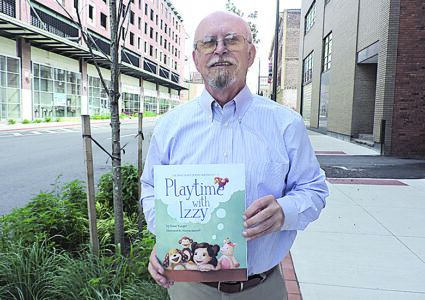Former Banker Gets Imaginative in Retirement as a Children’s Author

photo by: Emma Delk
Retired banker Dave Yaeger holds the first book, “Playtime with Izzy,” in his series “The Imaginary Friend Chronicles.”
WHEELING — Former WesBanco banker Dave Yaeger has launched a new creative endeavor in his retirement, transforming years of inspiration from raising three children into the children’s book series, “The Imaginary Friend Chronicles.”
The first installment in Yaeger’s seven-book series, “Playtime with Izzy,” is currently available for children to explore the imaginative world of the main character, Izzy.
Yaeger was first inspired to put pen to paper for the series during a visit to his great-niece, Isadora, in May 2023. He recalled being “stunned and fascinated” by her imagination while playing with her stuffed animals.
“I came back from the trip and said, ‘There’s a story there,'” Yaeger said. “So I sat down, and over the next three or four months, I wrote all seven stories for the series.”
The books chronicle Izzy’s adventures with her special ability to see and hear all imaginary friends. The first book focuses on a playtime session with Izzy, during which her imagination allows her to become a cook, waitress, doctor and nurse.
“The story for the first book is inspired by the visit with my great-niece when I saw her playing restaurant and doctor,” Yaeger said. “She even fixed a unicorn’s horn and gave it a diagnosis out of nowhere. That inspired me to come back and write these stories.”

Pages from “Playtime with Izzy,” which is the first installment of “The Imaginary Friend Chronicles” by Dave Yaeger. (Image Provided)
The book is intended for children ages 3 to 8, with Yaeger adding that the illustrations by Marina Saumell can entertain children who may not yet be able to read. Children can try to spot the Easter egg on each page of the tiny mouse hidden in Izzy’s house.
“There’s a little Easter egg for children to look for the mouse in the pictures,” Yaeger said. “Even if a child can’t read, they can look for that mouse, and some are pretty hard to find.”
In the second story of the series, the mouse in Izzy’s house will become her imaginary friend, Rose.
“Each book has a problem that has to be solved about imaginary friends, and in the second book, Izzy will learn the hard way that there are limitations to imaginary friends,” Yaeger said. “Izzy throws the ball to Rose, and it bounces through the kitchen and knocks a bowl off the counter. Izzy tries to blame Rose for it, but that doesn’t work.”
While Yaeger’s 43-year-long career as a banker did not often require him to think creatively, he had plenty of stories from raising his three children to draw from while writing the series. Yaeger’s daughter, Allison, serves as the inspiration for Izzy’s neighbor Alsie, who enters the third book of the series with a dragon as her imaginary friend.
“Stuffed animals serving as imaginary friends play a big role in the books, which goes back to my daughter Alsie in the third book,” Yaeger said. “Her bed would always be totally covered with stuffed animals growing up, and I always thought that there was a story in there as well.”
The final installment of the series will cover Izzy’s journey to “Imagicity,” where all imaginary friends and created and trained to become imaginary friends. This training includes learning how to become the type of imaginary friend a child wants, whether that be a mechanic or a giraffe.
Although the books focus on the fun and excitement that imaginary friends can bring, Yaeger noted that there is a scientific basis behind the phenomenon, with “30% of children” having an imaginary friend. He outlined that there are two types of imaginary friends children typically have: an invisible friend, which is a more “peer-to-peer” relationship, or a physical object that serves as the imaginary friend.
“I did not expect there to be so much research behind imaginary friends, and it was interesting to see what was out there,” Yaeger said. “There is always newer research behind the phenomenon coming out, and researchers are starting to get even more into the technicalities and psychology of imaginary friends.”
Yaeger admitted that he could not remember whether he had an imaginary friend growing up, but believes that his first stuffed animal likely served as a substitute for one. He noted that adults often “carry on the tradition” of imaginary friends for their children who cannot remember them.
“I was talking with somebody the other day about imaginary friends and they said, ‘Well, I had an imaginary friend named Johnny that lived out in a shed in our backyard, but I didn’t remember him until I got married and my great aunt gave me a present for my wedding from Johnny,'” Yaeger said. “It’s the adults that carry on the tradition of imaginary friends for the children.”
Though Yaeger dove into the psychology behind imaginary friends to create the series, he said the books are meant “purely for enjoyment” and to serve as a “celebration of the wonder of imagination.”
Yaeger added that writing the series allowed him to exercise his own imagination during his retirement. He joked that creating the series has become a full-time job, as he hopes to have the seven books completed by summer 2026.
“If you’ve got an ounce of curiosity, retirement is nothing to be afraid of because you finally have the time to work on the things that you want,” Yaeger said. “My son told me after he read the book, ‘You usually don’t find the words imaginative and banker in the same sentence, but there are exceptions to every rule.'”
“Playtime with Izzy” is available for purchase on Amazon or Yaeger’s website, daveyaegerauthor.com. Yaeger will also have copies of the book available at the local authors’ tent at the Wheeling Arts Festival on Saturday, Aug. 2.



